Pathways
A Podcast by NIWAP at American University Washington College of Law. The National Immigrant Women’s Advocacy Project, NIWAP (pronounced new-app) at American University Washington College of Law was formed to educate, train, offer technical assistance and public policy advocacy, and conduct research that will assist a wide range of professionals working at the Federal, State, and local levels who work with and/or whose work affects immigrant women and children. Our work is designed to promote the development, implementation, and use of laws, policies, and practices that benefit immigrant women and children.
Episodes
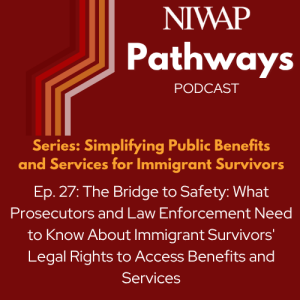
2 days ago
2 days ago
In this final episode on benefits and services for immigrant domestic and sexual violence survivors, Director Leslye Orloff, Assistant Director Rafaela Rodrigues of NIWAP at American University Washington College of Law, and Elliott Casey from the Virginia Commonwealth's Attorneys' Services Council continue their discussion with a focus on the importance of victim access to benefits and services from the perspective of law enforcement and prosecutors. The speakers cover key dos and don’ts when assisting immigrant victims with accessing benefits and services, and address questions about how prosecutors’ discovery obligations align with the support they provide to survivors—helping victims achieve safety, economic stability, and greater cooperation in criminal investigations and prosecutions.
More information on
Public Benefits
Public Benefits Map
NIWAP Web Library
NIWAP YouTube Channel
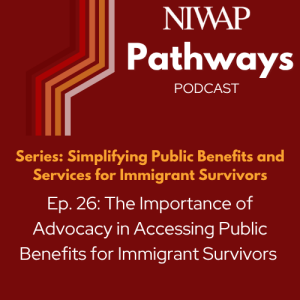
2 days ago
2 days ago
In this fifth episode on benefits and services for immigrant survivors, Director Leslye Orloff, Assistant Director Rafaela Rodrigues, NIWAP American University Washington College of Law, and Elliott Casey from the Virginia Commonwealth's Attorneys' Services Council continue their discussion, focusing on victim advocacy and how advocates and attorneys can help survivors navigate the process of applying for benefits and services that victims of domestic and sexual violence—and their children—are legally eligible to receive. They discuss the crucial role advocates and attorneys play in assisting immigrant victims with applications and identifying all the benefits and services for which victims and their children qualify. Advocacy also empowers survivors by ensuring that benefits workers receive legally accurate information about state and federal laws proving a victim’s and/or their child’s eligibility to approve applications. The discussion includes steps advocates and attorneys can take when victims’ benefits applications are wrongly denied. Advocates make a significant difference for immigrant domestic and sexual violence victims, and NIWAP highlights the importance of this role.
More information on
Public Benefits
Public Benefits Map
NIWAP Web Library
NIWAP YouTube Channel
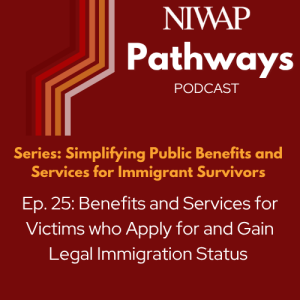
2 days ago
2 days ago
In this fourth episode on benefits and services for immigrant survivors, Director Leslye Orloff, Assistant Director Rafaela Rodrigues, NIWAP American University Washington College of Law, and Elliott Casey from the Virginia Commonwealth's Attorneys' Services Council continue their discussion, specifically focusing on benefits for crime victims. Immigration status and the state of residence of the victim are some factors that impact available benefits and services. Immigrant victims of crime are often eligible for more than one type of legal immigration status, and public benefits can be a factor in deciding which of the victim’s legal immigration options are best for the victim and their children. The major categories of legal immigration relief discussed in the context of economic stability provided are VAWA-related immigration relief, SIJS, T Visa, and U Visa. The speakers emphasize the importance of encouraging survivors to apply for legal immigration relief early, and the episode ends with data showing the positive impact that work authorization and access to the benefits and services safety net can have on the lives of survivors.
More information on
Public Benefits
Public Benefits Map
NIWAP Web Library
NIWAP YouTube Channel
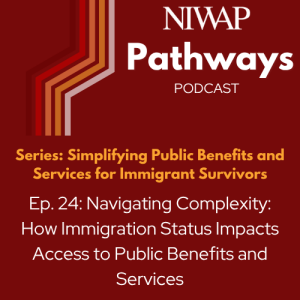
2 days ago
2 days ago
In this third episode on benefits and services for immigrant survivors, Director Leslye Orloff, Assistant Director Rafaela Rodrigues, NIWAP American University Washington College of Law, and Elliott Casey from the Virginia Commonwealth's Attorneys' Services Council continue their discussion on benefits and services, looking at eligibility for state and federal means-tested public benefits by legal immigration status. They discuss the most common survivors advocates, attorneys, and judges encounter and discuss, by type of lawful immigration status, eligibility for state or federal public benefits; which benefits are based on means testing; which benefits have a 5-year waiting period; healthcare subsidies; when immigrants become eligible to purchase healthcare on the exchanges; and lastly, the varying levels of state benefits that different states offer.
More information on
Public Benefits
Public Benefits Map
NIWAP Web Library
NIWAP YouTube Channel
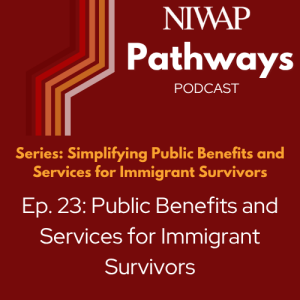
2 days ago
2 days ago
In this episode, NIWAP Director Leslye Orloff, Assistant Director Rafaela Rodrigues, NIWAP American University Washington College of Law, and Elliott Casey from the Virginia Commonwealth's Attorneys' Services Council continue their discussion on benefits and services for immigrant survivors. They begin by discussing the barriers to accessing benefits, the lack of knowledge, and the different eligibility requirements under state laws. They continue to talk about the various forms of programs, including educational, health, legal, and emergency benefits that immigrant domestic and sexual violence victims and their children are legally eligible to receive. They address income eligibility for state and federal public benefits and highlight how victims of domestic violence, sexual assault, stalking, dating violence, child abuse, and other crimes are legally eligible for some benefits in most states.
More information on
Public Benefits
Public Benefits Map
NIWAP Web Library
NIWAP YouTube Channel
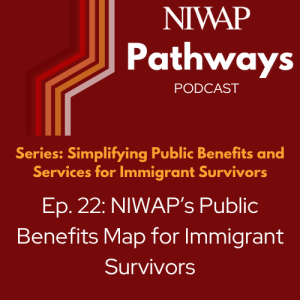
2 days ago
2 days ago
In this episode, NIWAP Director Leslye Orloff, NIWAP Assistant Director Rafaela Rodrigues, American University Washington College of Law, and Elliott Casey from the Virginia Commonwealth's Attorneys' Services Council talk about how to navigate and understand what public benefits and services are available to immigrant survivors through NIWAP’s created tool, the Public Benefits Map. They discuss the reasons behind creating the map to facilitate quick access to legally correct information identifying which programs and services immigrant victims and their children are legally eligible to receive. The map provides easy access to state-by-state laws on benefits and services, with exact legal citations, and includes details on which benefits and services victims and children with different immigration statuses can receive. They explain how the map makes it easy to identify the types of benefits immigrant survivors qualify for or do not qualify for. The map not only details types of benefits such as health, housing, education, TANF, SNAP, and food stamps, but also matches different legal immigration statuses — such as VAWA, T and U visa recipients, refugees, asylees, etc. — to the types of benefits available to them.
More information:
Public Benefits
Public Benefits Map
NIWAP Web Library
NIWAP YouTube Channel
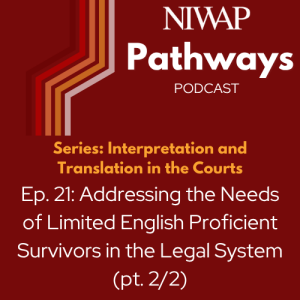
2 days ago
2 days ago
In this episode, Patricia Ravenhorst, General Counsel, South Carolina Coalition Against Domestic Violence and Sexual Assault; Susan Pearlstein from Philadelphia Legal Assistance; Hadar Swerdlow, Family Law Attorney from Atlanta Legal Aid; Judge Ramona Gonzalez from La Crosse County Circuit Court in Wisconsin; Commissioner Loretta Young, New Castle County Family Court in Delaware; Elliott Casey from the Virginia Commonwealth's Attorneys' Services Council; and Leslye Orloff, Director, NIWAP American University Washington College of Law, continue their discussion on best practices for using interpreters and translators when working with LEP victims and litigants. The panel discusses opportunities technology offers, best practices when working with virtual interpreters, and how to avoid the most common mistakes and pitfalls when working with LEP survivors.
NIWAP Web Library
NIWAP YouTube Channel
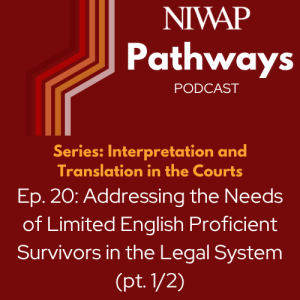
2 days ago
2 days ago
In this episode, Patricia Ravenhorst, General Counsel, South Carolina Coalition Against Domestic Violence and Sexual Assault; Susan Pearlstein from Philadelphia Legal Assistance; Hadar Swerdlow, Family Law Attorney from Atlanta Legal Aid; Judge Ramona Gonzalez from La Crosse County Circuit Court in Wisconsin; Commissioner Loretta Young, New Castle County Family Court in Delaware; Elliott Casey from the Virginia Commonwealth's Attorneys' Services Council; Rocio Molina, Deputy Director; and Leslye Orloff, Director, NIWAP American University Washington College of Law, examine the issues and challenges posed in serving victims who are limited English proficient (LEP). They focus the discussion on the needs of people who experience language barriers and what it means to be an LEP person. The conversation discusses the role of courts in employing best practices to overcome barriers by providing qualified interpreters that assist the court in its work with LEP victims and litigants. They further examine opportunities for developing creative solutions when resources are not available.
NIWAP Web Library
NIWAP YouTube Channel
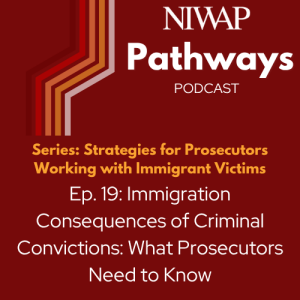
2 days ago
2 days ago
In this episode, NIWAP Deputy Director, Rocio Molina, immigration attorney, Cora Tekach, and staff attorney for Virginia Commonwealth’s Attorney Services Council, Elliot Casey discuss criminal convictions for offenses of domestic and sexual violence for immigrant perpetrators. They discuss the impact of immigration status and conviction on potential deportations, and the importance of factual and legal analysis in determining the outcome of removal proceedings. They talk about the due process rights of immigrants; what constitutes conviction under immigration law and what is a crime of moral turpitude and what is good moral character in the context of immigration law. The podcast cautions against making assumptions based on facts alone and to seek specialist advice in a matter involving immigration law.
NIWAP Web Library
NIWAP YouTube Channel
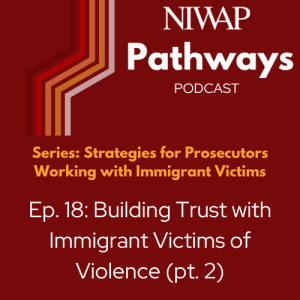
2 days ago
2 days ago
In this episode, Shannon Archer, Assistant County Attorney, Polk County, Iowa; Christopher Freeman, Senior Assistant County Attorney, Hennepin County, Minnesota; and Elliot Casey from the Virginia Commonwealth’s Attorney Services Council continue their discussion on working with the immigrant community to build trust, what steps prosecutors can take to avoid inadvertently sabotaging relationships with victims, and how the U Visa can enhance victims’ collaboration and law enforcement’s ability to hold offenders accountable. Potential pitfalls, such as making unrealistic promises, are also discussed, highlighting the importance of earning community trust through consistent, empathetic efforts.
NIWAP Web Library
NIWAP YouTube Channel




